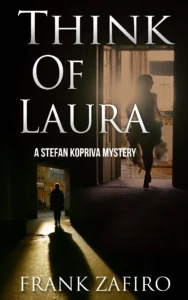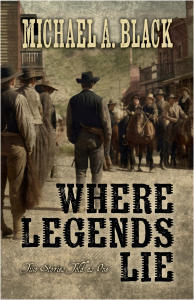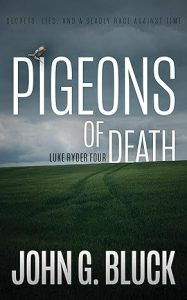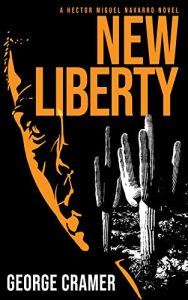News From the Top
President’s Message
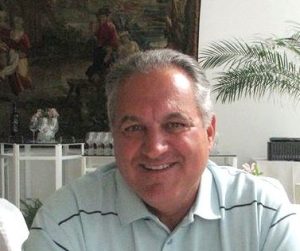 We’re less than two months away from the 19th annual Public Safety Writers Association Conference, July 12-14. Details are in the message from Program Chairman Mike Black below. With his leadership, your Board has been diligently planning the three-day event, which is shaping up to be amazing, educational, and enjoyable. If you are interested in participating on a panel, it may not be too late to contact Mike (docatlas108@aol.com).
We’re less than two months away from the 19th annual Public Safety Writers Association Conference, July 12-14. Details are in the message from Program Chairman Mike Black below. With his leadership, your Board has been diligently planning the three-day event, which is shaping up to be amazing, educational, and enjoyable. If you are interested in participating on a panel, it may not be too late to contact Mike (docatlas108@aol.com).
REMEMBER – TO GET THE DISCOUNTED RATE AT THE CONFERENCE HOTEL, YOU MUST REGISTER BY JUNE 15. THAT’S COMING RIGHT UP!
Don’t forget the terrific pre-conference workshop Thursday, July 11, focused entirely on techniques to improve your writing and chances of being published (again, details are in Mike’s report). I’ve attended several of these workshops over the years and found every one of them interesting and helpful. You won’t be disappointed!
We’re hoping you will let your other writing associations/groups/and author friends know about the PSWA and the conference. One of our continuing goals is increasing the membership of the PSWA, and the most effective way to do that is through word-of-mouth, so please spread the word about the organization and its benefits.
And, see Kelli Peacock’s Treasurer’s report to learn more about coffee service sponsorships and advertising in our conference program. An eye-catching ad is a good way to reach the membership, encourage people to check you out, and perhaps purchase a book or two.
We are looking for a volunteer to be the official photographer for the conference, to record the events, panels, awards ceremony, and so on. If you are interested, please let Vice-President Steve Ditmars know (steve@slditmars-author.com).
Lastly, the Board is always seeking ways to improve our organization. We welcome your help, constructive criticism, and suggestions, all of which we take seriously!
This will be my last newsletter column as president, as I will be stepping down at the start of the conference in July and turning the gavel over to our new president. It’s been my honor to serve as president for the past five years.
The Board’s main goal during my tenure was to continue strengthening our organization, making it better than when I first became president. I am confident your Board has accomplished that goal. The help and support of PSWA members, including past and present Board members, is what has made that possible. Your contributions are greatly appreciated and integral to the organization’s continued success. I will continue to be an active member of the organization, and will most assuredly be at future conferences (sitting back, relaxing).
I encourage you to continue to help improve the PSWA any way you can, and to continue to write, write, write. Over the 20+ years I have been a member, I have read a multitude of member’s books, and have never been disappointed. This group has and will continue to comprise wonderfully talented authors.
I look forward to seeing you at the conference and wish you much success with your writing. Keep up the good work in telling your tales for the reading public’s enjoyment and understanding.
John Schembra, PSWA President
Vice President’s Report
Greetings members!
It’s a busy time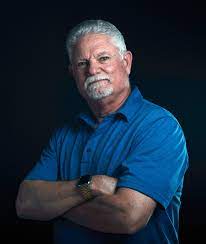 of year for the PSWA. We have our annual conference coming in July and Mike Black is putting together a great list of presenters and panels. If you haven’t been to our conference in Las Vegas before, this year will be a fantastic opportunity for you. You still have time to sign up.
of year for the PSWA. We have our annual conference coming in July and Mike Black is putting together a great list of presenters and panels. If you haven’t been to our conference in Las Vegas before, this year will be a fantastic opportunity for you. You still have time to sign up.
As I mentioned last quarter, my role on our Board of Directors is membership. Our membership has grown since my last newsletter report, but we still have room for more members. If you haven’t renewed your own PSWA membership, please do so soon, as we will be removing inactive members from the mailing list, email list (listserv), and private Facebook page access. These, as you know, are high-value “member benefits.”
Among the most useful to our writer-members is the PSWA listserv. Just in the last few days members have posed several good questions that received expert responses from our colleagues. If you are writing a new story, long or short, and need a technical question answered, take advantage of this resource.
Keep Writing!
Steve Ditmars, PSWA Vice President and Corporate Member
Secretary’s Report
 Spring cleaning isn’t reserved for the beginning of the season. During this time, many folks air out their homes after they were closed tight for the winter months. They also declutter basements and garages that somehow accumulate extra stuff when you’re not looking. It’s no different for the PSWA Board of Directors. We’re catching up on old business and prepping for the conference. It’s a busy, yet exciting time.
Spring cleaning isn’t reserved for the beginning of the season. During this time, many folks air out their homes after they were closed tight for the winter months. They also declutter basements and garages that somehow accumulate extra stuff when you’re not looking. It’s no different for the PSWA Board of Directors. We’re catching up on old business and prepping for the conference. It’s a busy, yet exciting time.
Part of the cleaning we’re undertaking pertains to the listserv (Google Groups) and our Facebook Group. As Steve’s message emphasizes, these are private platforms for PSWA members. If your membership is current, you have nothing to worry about.
However, if you haven’t renewed your membership for 2024, you’ll lose access to these benefits in the coming days. But, we don’t want to lose you! And, we hope you don’t want to lose access to the wealth of knowledge and camaraderie these services provide, either. Please renew today.
If you’re not sure whether you’ve renewed, please contact me and I’ll confirm.
Colin Conway, PSWA Secretary
Treasurer’s Report
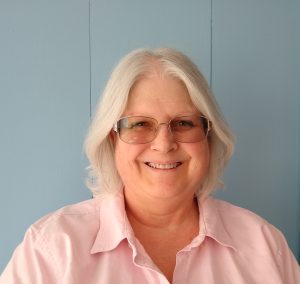 Ads, swag, and sponsorships oh my!
Ads, swag, and sponsorships oh my!
The conference will be here before we know it and it will be another awesome one. Plenty of opportunities for advertising in the conference program are still available. (See the details below.) Even if you think you may have missed the deadline, please contact me to see if there is time to run your ads.
Two high-profile sponsorships—the parties!—are still available. If you are interested, please contact me.
Swag is needed. We need items for the goodie bags. Even if you’re not attending this year’s conference, you can make your presence known through the swag bags. Your contributions should be small and unbreakable and may be crime-related or promotional. Examples include postcards, keychains, bookmarks, mini sewing kits, eyeglasses cloths, etc. The possibilities are endless. (People will be traveling with them, so items like mugs, cups, water bottles, etc., are impractical.) Send no more than 50 of each item no later than July 1, 2024, to:
Kelli Peacock
8983 East Orchid Vine Drive
Tucson, AZ 85747
2024 PSWA CONFERENCE PROGRAM ADVERTISING
Advertising is open to any PSWA member, regardless of whether they are attending the conference. If you would like to purchase space in the program, please send your advertisement to peacock.kelli3@gmail.com no later than June 10, 2024. The ad should be in one of the following formats: .doc, .pdf, or jpg and will appear in color. You may make your payment to PSWA via PayPal.
Inside front or back cover($250): 8.5″ x 11″ (trim); 8.875″ x 11.25″ (bleed)
Full page ($200) 8.5″ x 11″ (trim); 8.875″ x 11.25″ (bleed)
1/2 page ($100) 7″ x 4.625″ (horizontal); 3.5″ x 9.25″ (vertical)
1/4 page ($50) 3.5″ x 4.625″ (Vertical)
Questions? Email me at peacock.kelli3@gmail.com. This is going to be another wonderful conference, and I look forward to seeing all the wonderful items and advertising we receive.
Kelli Peacock, PSWA Treasurer
Conference Program Report
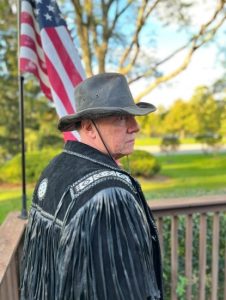 Notorious Nineteen—Almost Ready For Launch!
Notorious Nineteen—Almost Ready For Launch!
The 2024 PSWA Conference will be upon us in little more than a month. As I write this in the very merry month of May, your Board is working hard to get all the pieces in place for a fantastic conference! And, it’s looking good. We could always accommodate more registrants, so if you know people interested in taking their writing to the next level, tell them it’s not too late to sign up and be a part of the best conference of its kind. Enough said?
Logistics & Money Matters
FYI, the early-bird registration price will be in effect until the conference begins—a fantastic bargain! The Board extended the early-bird price in part because of temporary technical problems with our website that may have posed difficulties for some potential registrants. As a result, the conference price for all three days will remain at $275. Guest meals are $45 each for Friday and Saturday. As you know, we have to order meals and various other things in advance, so please encourage any vacillators to take the plunge and register ASAP.
If you plan to stay at the conference hotel, the Orleans, you’ll want to make your reservation before June 15 to get the conference rate. The discount code is PSWG24C, but if you tell the Orleans reservations desk that you’re coming to the PSWA Conference, they’ll accommodate you. If you book by June 15, that is. Or you can make your reservations through the conference page on the PSWA website.
Pre-Conference Workshop
We have a dynamite line-up of instructors for the pre-conference workshop July 11, including veteran former LAPD detectives and accomplished writers, Paul Bishop and Mike Brandt. Attendees can receive a one-on-one critique from an expert author of up to 30 pages of their manuscript. Evidence of the usefulness of this workshop is several members’ recent success publishing stories launched at this critique session. It’s a real chance to take your writing up a notch or two. Believe me, you won’t want to miss it! The workshop begins at 9:00 am on Thursday and runs until 3:00, when conference check-in starts. The extra charge for the workshop ($45) covers the cost of the room.
A Few Session Highlights
Paul Bishop, who will present at both the workshop and the conference, is the acquisitions editor for Wolfpack Publishing. A highly regarded and decorated LAPD detective, Paul will be talking about something near and dear to his heart, The Art of Interrogation, as well as participating in the popular Publishers Panel, along with other distinguished guests from the book publishing field. Other panels and topics include: Colin Conway and Frank Scalise (aka Frank Zafiro) on Writing with a Partner (these two guys are as entertaining as Penn and Teller, except both of them like to talk); Janet Gregor and Gloria Casale, who have a few surprises up their sleeves, on How to Poison Someone (and get away with it); and retired FBI Special Agent Scott Decker on Everything Writers Need to Know about Copyright—some of which he learned the hard way.
Capsule Schedule
If you arrive on Thursday, about 6 pm you’ll enjoy our famous get-acquainted party, including finger foods and a cash bar—a great way to see old friends and make some new ones.
Friday, July 12th, the conference sessions run from 9:00 to 5:00 pm. That evening, Colin Conway will host an informal Indie Authors’ Get-Together at one of the hotel restaurants. As it’s not part of the regular conference programming, attendees will be responsible for their own drinks, meal, and conversation. Count on its being informative and fun, especially if you’re interested in going the self-published route.
Saturday, July 13th, the program runs from 9:00 until about 5:45, including an informal get-together and book sale from 5:15 until the Writing Competition Awards Ceremony starts. That ceremony runs from 5:45 pm until about 8:00 pm, with complimentary finger foods and a cash bar. (Last year’s spread was delicious!) It’s a great chance to cheer on your fellow members’ successes (and maybe your own).
Sunday, July 14th, the program again starts at 9:00 and goes until about one-thirty or two in the afternoon. Last year, several of our best panels were on Sunday morning! So don’t fly home too soon. There’s no Sunday luncheon, but there will be goodies (and coffee! etc.) in our meeting room Sunday morning.
Raffle and Bookstore
All three days, we’ll raffle off some really nice gifts, including gift certificates for the PSWA Bookstore and Amazon.com, editing and critiquing services, complimentary registrations to next year’s workshop and conference, and much more. The raffle tickets are free—if you’re registered for the conference, you’re automatically entered.
If you want to bring books to sell, we’ll handle sales for you in the PSWA Bookstore. One reason we moved the awards ceremony to Saturday was to give people a chance to find out who the winners are and buy their books. Also, with plenty of talented authors in attendance, you can get your favorite books signed. We’re looking into the best way to ship your books to the hotel, if you don’t want to bring them yourself. Details will follow on the listserv.
I hope to see you all there, and I guarantee you’ll have the time of your life.
Michael A. Black, PSWA Program Chairman
Writing Competition Report
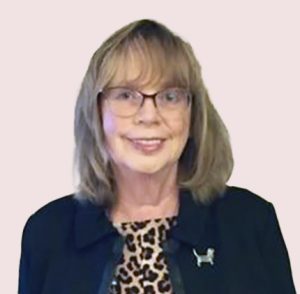 I’m getting excited about Notorious Nineteen and hope you are too! We always have a wonderful time, meet fascinating people, and learn something too. A highlight for me is the Writing Competition Awards Ceremony, which, as Mike explained above, will be held Saturday evening, July 13. I’m so glad that many of you who entered the competition are also attending the conference. I love to give the award to the winner in person!
I’m getting excited about Notorious Nineteen and hope you are too! We always have a wonderful time, meet fascinating people, and learn something too. A highlight for me is the Writing Competition Awards Ceremony, which, as Mike explained above, will be held Saturday evening, July 13. I’m so glad that many of you who entered the competition are also attending the conference. I love to give the award to the winner in person!
We had an astonishing 72 entries this year, and by mid-May, I’d received all the judges’ scores, one of whom summed the experience up nicely: “All the entries were outstanding! The difference between places might have been a missing comma or grammar error, because all of the content was interesting and the writing was almost flawless. This has become a high-level competition.” I couldn’t agree more. The comment also underscores the importance of editing and proofreading! Many times submitting a more professional, polished product makes the difference in whether a good story actually wins an award.
The last task for the judges of the published books was selecting the best book cover, taking into account genre. This was a first for us and turned out to be an interesting and enjoyable exercise. We’ll have to see how this new award is received. The judges, who are unpaid and work extraordinarily hard, will be rewarded with a thank-you pizza!
This year there will be a single Marilyn Meredith Excellence in Writing Award, which will go to the highest-scoring published book. Quite an honor. I sure hope that winner will be present! But if you can’t attend, you can read the list of winners on the PSWA website on Sunday. Also on Sunday, we will feature the winners’ books at a special spot in our bookstore.
That’s it for me. I hope to see most of you soon.
Barbara M. Hodges, PSWA Writing Competition Chairperson
Member News
 Camille Minichino (1937-2024)
Camille Minichino (1937-2024)
Long-time and much-admired PSWA member Camille Minichino died May 6 after a brief illness. Not only did she participate in our annual conference and contribute articles to our newsletter, she helped build the organization by bringing new members to it and befriending fresh faces.
Born in Revere, Mass., she cultivated her love of mathematics and physics at Boston’s Emmanuel College, graduating with a BA in mathematics. She belonged to the religious order of the Sisters of Notre Dame for 18 years, during which time she attended Fordham University (one of three women in a department of nearly 80 students), obtaining her PhD in physics in 1968. She left the order, moved to California, and had a 30-year career at Lawrence Livermore National Laboratory, working on nuclear energy and nuclear waste management, subject of a book she co-authored in 1982.
As an educator and professor, Camille developed and taught physics, mathematics, philosophy, critical thinking, and interdisciplinary courses at numerous prestigious colleges in Boston and California. She also developed and taught writing classes and workshops at community colleges and through various writers’ organizations. Some of these activities reflected the third phase of her professional journey: writing mysteries. Camille authored nearly 30 published mystery novels and numerous short stories. Her mystery series, which reflected her experiences and passions, included The Periodic Table Mysteries, The Miniature Mysteries, the Professor Sophie Knowles Mysteries, The Postmistress Mysteries, The Alaskan Diner Mysteries, and the Sister Francesca Mysteries, described here.
Her friends remember her love of See’s Candies, well-crafted decaf cappuccinos, movies and parties, and designing and creating miniature scenes (some law-enforcement themed! See a gallery of her work). She supported her artist friends, raised her hand when volunteers were requested, and lent an ear when a friend, family member, or student needed it.
She married Richard Rufer (her “tech support”) in 1977, and he inspired her book How to Live with an Engineer. Dick died earlier this year, a loss friends say broke her heart.
Camille’s friends compiled this summary of her remarkable life, to embody what they termed their “shared joy at having had Camille in our lives.”
Other Member News
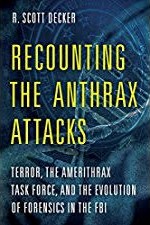 PSWA conference featured presenter, former FBI agent Scott Decker, appeared in last month’s CNN documentary, The Way it Really Happened.
PSWA conference featured presenter, former FBI agent Scott Decker, appeared in last month’s CNN documentary, The Way it Really Happened.
Scott was one of the principal investigators of the anthrax attack shortly after 9/11. The scope and investigative efforts were nothing short of phenomenal.
(As a person who lives a mile from where several of the anthrax letters were mailed and whose mail for a long time came in irradiated plastic bags, and as a fellow U-Michigan alum, I read Scott’s excellent book with interest!—ed.)
Fifth in Frank Scalise’s Stefan Kopriva Mystery series—Think of Laura—is now available through the Code 4 Press Bookstore in ebook format and coming in paperback later this summer. It’s another in his series of River City stories. In this one, the truth seems to elude ex-cop Kopriva as he searches for a missing woman—hiding? murder victim? Frank says copies will be available at the conference ($15) if you let him know in advance that you’ll want one.
PSWA corporate member Mike Black’s story, “Nobody Cares” will appear in a forthcoming issue of Alfred Hitchcock Mystery Magazine. Mike notes that the genesis of this story was a session at a PSWA Pre-Conference workshop (all the more reason to sign up, he says!). In June, his new novel, Where Legends Lie, comes out in large print, with the trade paperback coming in July. (Copies for the conference? He hopes so.) The novel intertwines two stories set 33 years apart. In 1913, a veteran of the Philippine-American war, Jim Bishop, is helping make a movie about a famous 1880 gunfight in Contention City, Arizona. As the filming proceeds, Jim suspects everything is not as it should be in this world of motion picture make-believe and, eventually, he begins to wonder what really happened in Contention City thirty-three years earlier. Back in 1880, in the waning days of the Old West, notorious outlaw Dutch Bascom contacts Contention City Sheriff Lon Dayton about the territorial governor’s amnesty for Bascom and his brutal gang. Dayton must sort out Bascom’s true intentions, as well as the aims of the unscrupulous politicians and railroad men who claim they want the outlaws’ surrender. The secret of what really happened in Contention City emerges only after he pierces the deceptions and betrayals that lead to more violence and a new appetite for vengeance. Exciting stuff!
Pigeons of Death, the fourth novel in John G. Bluck’s Luke Ryder mystery/thriller series, was published May 28 by Rough Edges Press, an imprint of Wolfpack Publishing. In it, renowned thoroughbred trainer Mark Spice meets a chilling end at his own gala. To find the culprit, Kentucky Deputy Sheriff Luke Ryder, poses as a stable hand, but his quest is complicated by his attraction to Spicer’s widow, who has dangerous secrets of her own. Set against the opulent backdrop of thoroughbred horse-racing and the shadowy manipulations of drug cartels, Luke’s mission pits him against a network of corruption that extends far beyond the rolling hills of the Blue Grass State. As he moves closer to justice, Luke and Carmen find themselves playing a cat-and-mouse game that any moment could turn deadly. Read more about John here.
The new thriller by member George Cramer, New Liberty, was published last month by Russian Hill Press, with the audio version (narrated by Chase Johnson) released a month earlier. In the story, Hector Navarro’s parents, wealthy east coast college professors, raised him to work towards making the world a better place. As a young police officer in New Liberty, Arizona, he sees how gangs have ravaged the city and struggles with why his partner, his mentor, killed himself. In a town where human trafficking, drugs, and violence rule, Hector’s fate is about to be linked with that of a contract assassin. But this vividly written urban crime novel isn’t all black and white and digs into more than just greed and power.
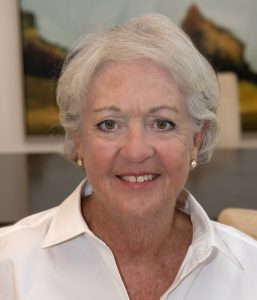 Member Meg Roche (pictured) author of The Nurse-Detective Mysteries, has a new book out—not a crime story this time—but well demonstrating her varied talents. TOOTS is the unforgettable tale of one woman’s path to self-discovery. From the time she traveled from the shores of her home in Ireland and crossed the sea to America at the age of ten, Annie Smith worked to support herself. And just when she thinks her life is settled and it’s as good as it will get, she meets a handsome homesteader who sweeps her off to the plains of Nebraska for a life she never could have imagined. A celebration of trailblazing Irish-Americans and the resilience of the human spirit, TOOTS inspires us all to face challenges head-on and fight for the lives we want to live.
Member Meg Roche (pictured) author of The Nurse-Detective Mysteries, has a new book out—not a crime story this time—but well demonstrating her varied talents. TOOTS is the unforgettable tale of one woman’s path to self-discovery. From the time she traveled from the shores of her home in Ireland and crossed the sea to America at the age of ten, Annie Smith worked to support herself. And just when she thinks her life is settled and it’s as good as it will get, she meets a handsome homesteader who sweeps her off to the plains of Nebraska for a life she never could have imagined. A celebration of trailblazing Irish-Americans and the resilience of the human spirit, TOOTS inspires us all to face challenges head-on and fight for the lives we want to live.
Bill Soldato, whose book Billy the Liquor Guy won PSWA’s Marilyn Meredith Award for Excellence in Non-Fiction Writing last year, is busy doing book signings. May 31 to June 2 he was at crime.con in Nashville, and he’s scheduling another at the restaurant/entertainment venue Margaritaville in Syracuse’s giant mall, Destiny USA. These outings are in anticipation of his second book, The Making of Billy the Liquor Guy coming out in a few weeks.
Vicki Weisfeld’s short story “Among the Long Shadows,” also will appear in Alfred Hitchcock Mystery Magazine’s July/August issue. It’s her fourth published story featuring Brianna Yamato, a brand-new reporter for the Sweetwater (Tex.) Register. Tiny, female, and considered “foreign,” Brianna has her hands full investigating crimes and outmaneuvering the Texas good ol’ boys. In this story, murder haunts the National Women Airforce Service Pilots (WASP) World War II Museum, a real-life Sweetwater attraction.
The Writing Craft: Upping Your Game
AI and the Writing Process
The Authors Guild has written a set of best practices for authors as they encounter artificial intelligence issues in writing and publishing. Here’s a link to the organization’s full set of recommendations, summarized in this article.
AG acknowledges that whether authors use AI as a tool in their writing is a personal decision, but recommends some ethical ground rules. Further, the large language models (LLMs) that have created the generative AI tools are, AG says, “based on infringement, and it is in the professional interest of all writers to commit to maintaining standards that allow all writers to practice their vocation successfully.”
In a nutshell, here are AG’s suggestions for using generative AI ethically:
- Use it as an assistant for brainstorming, editing and refining ideas, rather than a primary source of work.
- Rewrite AI-generated text in your own voice before adopting it. “If you are claiming authorship, then you should be the author of your work.”
- Disclose to your publisher and reader any appreciable amount of AI-generated content. Increasingly, author contracts include language prohibiting such content, and publishers’ submission guidelines prohibit it.
- Don’t use AI technologies to copy or mimic other authors’ unique attributes (style, voice, etc.) in ways that could harm their works.
- Thoroughly review and fact-check all AI-generated content. You cannot trust that it will be accurate or free of bias, like Google’s search AI tool that recommended putting glue on pizza.
- Support creative professionals in other fields (for example, voice actors, translators, illustrators, cover designers, and others) from generative AI exploitation.
The Authors Guild recommends that, if your work does have AI-generated elements, you discuss this with your agent and publisher so that they can amend your contract or tailor its terms appropriately for your protection. (Note that AI-generated material cannot be copyrighted.)
If you publish a book using KDP, you also must disclose AI use (text, images, translations) to Amazon.
Publishers are beginning to accept contract provisions that would prohibit the use of their authors’ work for training large language models without permission. However, publishers themselves are exploring using AI as a tool in their everyday editorial and marketing functions, so may not agree to blanket prohibitions.
In other words, the field continues in a state of flux, and savvy authors will stay on their guard.
Dialog that Fits your Characters
At 722 pages, Elizabeth George’s A Traitor to Memory, one of her mysteries about London police Inspector Lynley, is practically a saga by today’s standards. One of its chief virtues is George’s terrific dialog. How her characters speak moved front-and-center in the story when she introduced a young California woman. Until Libby Neale starts talking, you might fall unawares into the story’s UK speech rhythms and word choices—except for the odd “boot,” “nappy,” and the like. The contrast Libby provides makes you notice how “British” everyone else’s speech is.
It isn’t just how Libby speaks, it’s what she chooses to speak about that makes her so distinctively American. If something is on her mind, she says it. By contrast, the British characters are painfully reserved, which serves them well, because many of them are lying, anyway. Here is Libby trying to engage the main character/narrator, violin virtuoso Gideon Davies:
“What’s up then? You don’t look so great. Aren’t you cold? What’re you doing out here without a sweater?”
Looking for answers, I thought.
She said, “Hey! Anyone home? I’m, like, talking to you here.”
I said, “I needed a walk.”
She said, “You saw the shrink today, didn’t you?”
Later Gideon and his violin teacher waltz so slowly around the subject of Gideon’s psychotherapy, no wonder it took 722 pages to complete the story!
 Libby provides a breath of fresh Pacific Coast air, but author George does a great job with dialog for all her characters. Yes, there’s the familiar contrast between Inspector Lynley (8th Earl of Asherton) and his working-class partner, Constable Barbara Havers (played by Nathaniel Parker and Sharon Small, pictured). But this story also contains an East German refugee who has perfected her English accent, but not quite mastered word order, lower-class accents of two young toughs from the council flats, and a younger woman who speaks differently and more directly than her older lover of the same social class. None of them devolve into caricature.
Libby provides a breath of fresh Pacific Coast air, but author George does a great job with dialog for all her characters. Yes, there’s the familiar contrast between Inspector Lynley (8th Earl of Asherton) and his working-class partner, Constable Barbara Havers (played by Nathaniel Parker and Sharon Small, pictured). But this story also contains an East German refugee who has perfected her English accent, but not quite mastered word order, lower-class accents of two young toughs from the council flats, and a younger woman who speaks differently and more directly than her older lover of the same social class. None of them devolve into caricature.
George doesn’t stop there. The characters’ actions often reflect the same turn of mind that their words do. Libby goes off half-cocked, intuition leads her astray, and her last impulsive act detonates the book’s conclusion. Careful language is appropriate to the characters who take time to get their stories straight. The precise German is putting her romantic ducks in a row. In other words, how they speak provides insight into how they think and what they do. Too often snappy television-style dialog never goes beneath the surface, denying readers the pleasure of truly engaging with characters.
Although the slang in this book will become dated, it nevertheless feels like the characters are real-life, unique individuals, with their own specific energy behind them, energy that leads to the actions only they would take. And, therefore, plot. For a writer, it’s inspirational, really.
Publishing Tips and Travails
“No One Buys Books!” Really?
 If you follow the book publishing field at all, you probably saw reference to a recent article that used the click-bait headline above. If it fell short on its interpretation of facts, it was a massive success as a lively discussion-starter.
If you follow the book publishing field at all, you probably saw reference to a recent article that used the click-bait headline above. If it fell short on its interpretation of facts, it was a massive success as a lively discussion-starter.
The author’s source material—quotable nuggets and stats—came mainly from the 2022 anti-trust case opposing Penguin Random House’s bid to purchase Simon & Schuster. Despite the article’s “gosh, can you believe it!” tone, and her misleading claim that most books sell less than a dozen copies, certain facts about the publishing industry are certainly, uncomfortably correct. Jane Friedman summarized them as follows:
- Most books don’t sell in significant numbers. And has always been the case.
- Most books (about 70 percent) don’t earn out their advance. Of course, new authors, mid-list authors, and self-published authors don’t ever see an advance.
- The majority of authors, at least early in their careers, can’t survive on book advances or book sales alone. Long true, and not just for authors. The work of most visual artists, actors, musicians—people in any creative field—is woefully undervalued.
- Big publishers pay high advances to celebrities, politicians, etc. Of course. They’re in business to produce books that will sell.
- Publishers do not adequately support the titles they publish with marketing and promotion. Two million new commercially and self-published titles come out every year. For any number of reasons, promotion has declined, but it’s awfully hard to make a splash in that ocean of books.
- Authors and smaller publishers have been gaining in market share since at least 2010. This is partly thanks to Amazon, ebooks, audio, and print-on-demand, as well as the increasing savvy of independent writers. Digital publishing, baby.
The statement No one buys books just isn’t true. In fact, Friedman says, “book sales look healthier now than they did five years ago.” At the same time, the publishing industry’s business model is long overdue for a re-think. If you’re interested in more information about this hot-button issue, read Lincoln Michel at Counter Craft.
“When’s the Movie Coming Out?”
 Wouldn’t every author like to have a solid answer to THAT question? Followers of the WriterBeware blog—and every author should be!—receive regular, reliable information that punctures those balloons about instant authorial glamor and success. The number and sheer diversity of scams attempted on authors is a scandal. While PSWA authors would seem better able than most people to spot a fake opportunity, we shouldn’t underestimate the power of hope.
Wouldn’t every author like to have a solid answer to THAT question? Followers of the WriterBeware blog—and every author should be!—receive regular, reliable information that punctures those balloons about instant authorial glamor and success. The number and sheer diversity of scams attempted on authors is a scandal. While PSWA authors would seem better able than most people to spot a fake opportunity, we shouldn’t underestimate the power of hope.
Recently, WriterBeware readers have reported an increasing number of new scams to squeeze money out of authors lusting after a movie deal. “Hollywood calling”? Right.
To help writers recognize these bogus contacts, WriterBeware has published “How a Book Really Becomes a Movie.” Worthwhile reading.
Authors Publish Changing its Format
For almost a decade, Authors Publish has provided weekly email updates about book publishers and magazines seeking fiction, nonfiction, poetry, etc., describing the ask and the publisher’s requirements. Handy and reliable as that’s been, changes in the publishing ecosystem are prompting an end to these in-your-inbox reports as of this month. (For a sample of the AP’s useful content, see this recent list of 30 mystery publishers who accept non-agented submissions.)
Editor Emily Harstone explained the change. First, she says, AP is a victim of its own success. Ten years ago, when the staff reviewed a publisher, their reviews “made little impact on the number of manuscripts a publisher received.” Today, a review causes a massive spike in submissions, which some publishers find overwhelming. Worse, many subscribers mass submit to the publishers reviewed. Sending material a publisher does not—and never will—want (wrong genre, wrong audience target), creates a logjam and encourages publishers to stop accepting unsolicited submissions or to offer shorter submission windows. For example, I’ve seen publishers say they’ll consider only “the first hundred submissions.” AI has only increased the flow of unwanted material.
Authors Publish will still review publishers, but use the information to update its Guide to Manuscript Publishers twice a year, create round-up articles on special issues (like mystery), and work to reach underrepresented authors.
Give a Great Book Reading!
The New York Chapter of Mystery Writers of America recently held a session to help members give a good book reading. My writing group, which included about a dozen authors and met monthly for years (until covid), sponsored readings at our local library. In March and October, about six of us would read for an audience of some twenty or thirty people. Many came because they were family members not given a choice and some came for the refreshments—but the benefit was not the size of the audience, it was gaining experience in reading our work aloud.
When the opportunity arose to do a reading for the MWA-NY at the, yes, “KGB Bar” in lower Manhattan, I was ready. I’d learned a lot at the local library, which I’ve combined below with the MWA’s suggestions.
- Select your reading extract, which doesn’t have to be the beginning of your story. Read it out loud and time it. Also practice your set-up: “Uhhhh, this book is about uhhh a man growing up in the Depression who joins the Air Force. Of course it wasn’t the Air Force back then, it was uhhh the uhhh Army Air Force, because, you see, they weren’t sure . . .” No. And make sure your intro and excerpt don’t exceed the time allotted. Don’t know how much time you have? Ask. Nothing is more off-putting to an audience (and your fellow authors on the program) than someone who turns an eight-minute slot into a 20-minute monologue. Grrrr.
- Preparation. Your audience will assume you can read. But that ability isn’t the same as reading fiction out loud with meaning and feeling. You have to practice, just as any actor does. Mark up your text (printed out in a VERY large font in case the lighting is bad. Painful lesson learned there.). I’ve seen younger authors read from their phones; ok, but that would be a blur to me. Vary the emphasis, vary the speed and pitch. In other words, you have to practice. What word/s do you stumble over? Circle them. Practice enough and you’ll know the material so well you can recite a line or so without looking at the text. That’s time you can glance up and make eye contact with your audience. The MWA advises, “Spend some time before a mirror!” If you do and you never see yourself, you’re not looking up. And, “Unless you are a trained voice actor, avoid ‘doing the voices.’”
- Last–minute stuff. Remember to take your book, business cards, bookmarks, and water bottle. AND your marked-up script. Good to go.
- Execution. “Plan to have a good time!” Arrive early to meet people. Drink water before the talk, introduce yourself to make sure people can hear you, breathe. If, heaven forbid, you have to hold the microphone, don’t unconsciously wave it about like a parade-day flag. Steady on. Finally, in my experience, the Q&A is the best part. Enjoy it!
Editor’s Turn
AI and Policing
 Geolitica is a maker of the crime prediction software purchased for about $20K by the Plainfield (NJ) police department. In 2018, the software made 23,631 predictions indicating a crime was likely to occur in one of the locations not patrolled by the local police department. Its success rate? Less than half a percent. Worse than random. This finding is part of a much longer article on crime prediction software, which seems a ripe target for fiction. In fact, it may be fiction already, at least in its current incarnation.
Geolitica is a maker of the crime prediction software purchased for about $20K by the Plainfield (NJ) police department. In 2018, the software made 23,631 predictions indicating a crime was likely to occur in one of the locations not patrolled by the local police department. Its success rate? Less than half a percent. Worse than random. This finding is part of a much longer article on crime prediction software, which seems a ripe target for fiction. In fact, it may be fiction already, at least in its current incarnation.
Seen on Facebook: “You know what the biggest problem with pushing all-things-AI is? Wrong direction. I want AI to do my laundry and dishes so that I can do art and writing, not for AI to do my art and writing so that I can do my laundry and dishes.” I’m sure men could say the same for “mow the lawn, take out the trash, and clean the garage.”
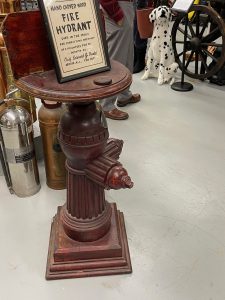 Photo Highlight: At left is an old wooden fire hydrant on display at the New Jersey Fire Museum and Fallen Firefighters Memorial, Allentown, New Jersey.
Photo Highlight: At left is an old wooden fire hydrant on display at the New Jersey Fire Museum and Fallen Firefighters Memorial, Allentown, New Jersey.
Lots of interesting history, early fire alarm systems (some rather dangerous!), and beautifully restored historic fire engines! Take a look!
June 6, 1944. We visited Normandy in June 1984, around the time of D-Day’s fortieth anniversary. The cemeteries of different combatant nations differed greatly in concept and impression. The American dead were buried in evenly spaced, orderly rows of brilliantly white markers. The British clustered small groups denoting unit comrades—together in death, as in life. In the German cemetery, many ground-level markers merely read Ein Deutscher Soldat—A German Soldier—an arrangement broken up by occasional groups of dark and brooding stones.
